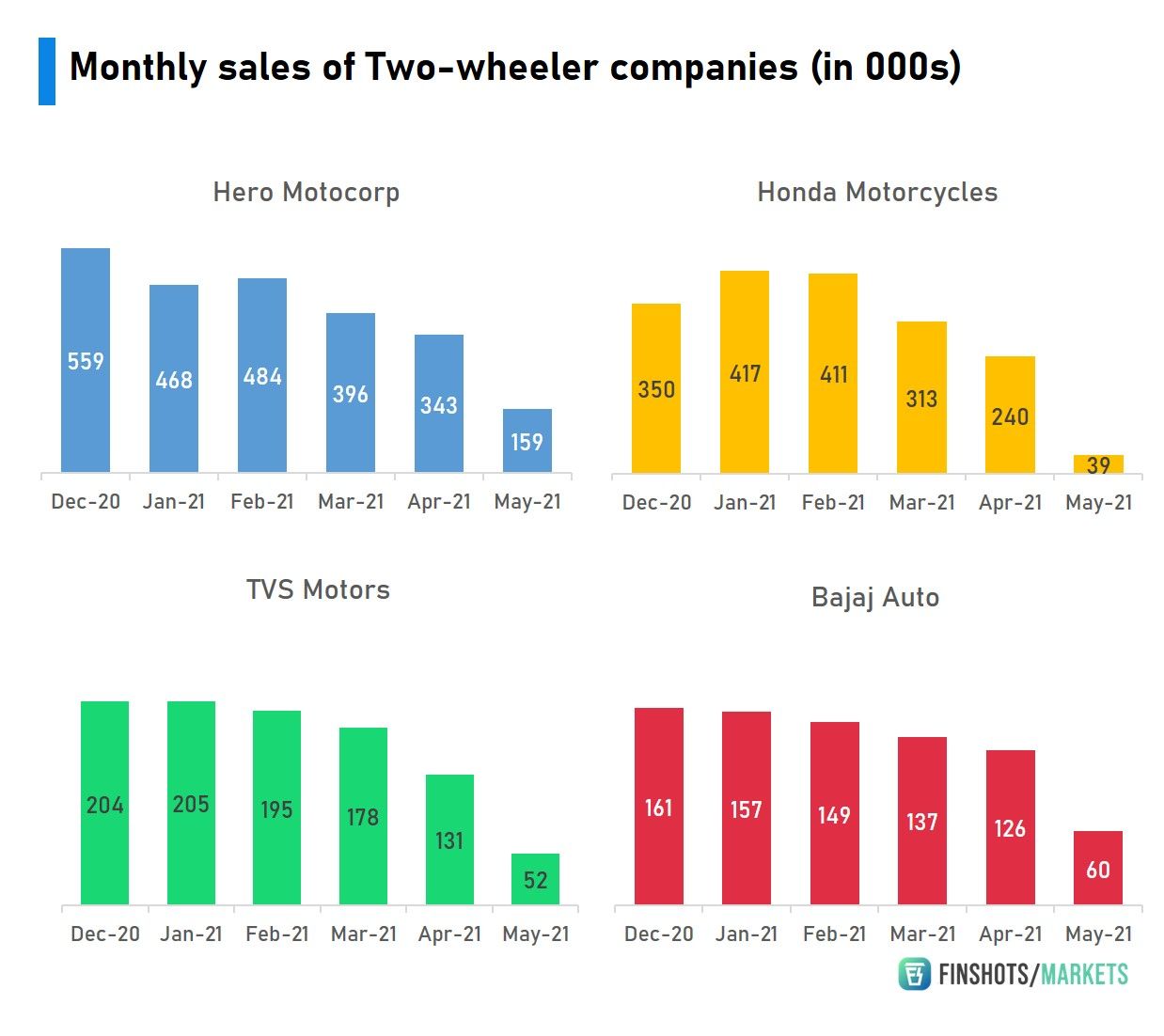The Auto Nightmare continues
Friday, June 4, 2021 by Finshots

In this week’s Finshots Markets we talk about automakers and the horrible month they just had.
The Story
Signs of an auto slowdown first began to emerge back in 2018. At the time, incumbents weren’t too concerned about their prospects. They hoped that sales would bounce back eventually. But alas, it didn’t.
Because this wasn’t just a problem brewing in the auto sector. It was in fact symptomatic of a larger economic slowdown crippling multiple industries at the same time. And Covid only made it worse. Automakers shut shop. Consumers focused on other more important things. Dealers walked away from the business altogether and the industry was in crisis. However, nobody expected the whole scene to play out once again this year.
Look at passenger vehicles for instance. After dealing with the pandemic and the nationwide lockdown last year, major car manufacturers were beginning to see some light at the end of the tunnel. As people began ditching public transport for personal vehicles, it seemed as if the tide was finally going to turn. In fact, things started looking up right after the festive season last year. Unfortunately, there was one niggling problem — Semiconductors.
If you’ve been following the news of late, you know the world is now witnessing a semiconductor shortage of epic proportions. Without semiconductors, you can’t have sophisticated electronic equipment that powers vehicles. Without these sophisticated components, automakers can’t push their cars off assembly lines. Fortunately, though, automakers already had a massive inventory backlog and they rallied on despite these issues.
Until that is, the 2nd wave made landfall. Demand vanished almost overnight as multiple states began imposing lockdowns. Maruti Suzuki, India’s largest carmaker, shut production facilities between May 1 and May 16. Their sales dipped by a whopping 75% last month compared to April. And it wasn’t just an isolated incident. Hyundai’s sales fell by 49%, Mahindra & Mahindra’s sales fell by 56% and Tata Motors fell by 40%. Needless to say, the whole passenger vehicle market had to shut shop for most of last month.

But it’s not just about passenger vehicles. Commercial vehicle sales also took a beating in May. As states imposed restrictions on the free movement of goods, truck owners were forced to sit back and watch from the sidelines. In fact, most fleet owners had trouble financing their operations and arranging for new vehicles (since bankers couldn’t tell for sure when things would normalize). And considering these people no longer had the wherewithal to spend on new trucks, sales of Tata Motors and Ashok Leyland, the top two commercial vehicle companies, crashed 35% and 62% in May when compared to April 2021.
Meanwhile, two-wheelers have also suffered the same fate thanks to a sustained dip in demand from India’s hinterland. It’s sort of like this — You could attribute a sizeable portion of new demand for scooters and motorcycles to small towns and rural areas. A good monsoon can often uplift spirits and boost spending. But Covid has pervaded all walks of life and the impact of the virus has been particularly acute on the rural population.
First, despite a relatively decent monsoon, we are yet to find out if the virus has affected supply chains. For instance, if farmers can’t take their produce to the mandis, then they don’t make much money. Secondly, fewer people have applied to MNREGA this past month, when compared to the same figures last year. Put together it’s safe to say that farm income is likely to dip this time around and it doesn’t bode well for the rural economy.
Hero MotoCorp, the largest two-wheeler company, halted production across every single manufacturing facility in the country between April 22 and May 16. Their sales fell by 51% in May when compared to the same period last month (April). Among other players, Bajaj Auto and Chennai-based TVS Motors reported a 52% and 60% decline in sales respectively.

Then you have the dealers who’ve really had to take it on the chin. Right when they were beginning to think the pandemic had subsided, the 2nd wave took India by storm. They were stocking their showrooms in the hopes of catering to all that pent-up demand. Unfortunately, they stocked new inventory and tied up their capital, only to see their dealerships close after lockdowns became commonplace across the country. They are begging for relief and hoping that the government might extend a moratorium on loans or perhaps reduce the interest burden. We don’t know if that will happen anytime soon.
Bottomline — May has been a horrid month for most automakers. And while industry analysts are hoping for a swift turnaround of fortunes, it’s safe to say that their estimate will ultimately hinge on India’s success with its vaccination policy. If we manage to vaccinate a sizeable part of India’s population over the course of the next few months, maybe we could expect to see some of that pent-up demand help turn the tide. However, if another wave tears through the population once again, then we aren’t sure those optimistic assessments will really play out as the analysts expect.
Until then…
Share this story on WhatsApp or Twitter.
How to wage a war against junk food?
When people found out that 60% of all of Nestle’s products might have been unhealthy, it sent shockwaves across the globe. But if you want to know how this news affects you, you should probably read this article we published on Friday
Also don't forget to share this article on WhatsApp or Twitter.





